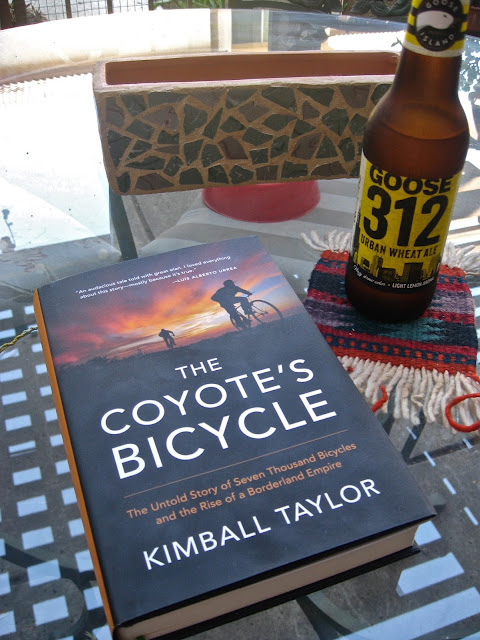From the Library: The Coyote's Bicycle
When I, like most people, visit a bookstore there are specific topical sections I am drawn to, and others I completely ignore. Social sciences, history, current events - yes. Romance, religion - no. Sports - yes. Magazines - yes, though only the cycling section. Fiction, literature - yes, though only (normally) to look for Roddy Doyle's Oh, Play that Thing, the second book in a trilogy that I can't finish because I can't find the middle book, and though the third book has been sitting on the shelf, unopened, for a couple years at least. Beyond those, the strategy is simple - look for books with bikes on their covers. The sports section usually has something, though most of what is there is old news, already read, or uninteresting training manuals. Finding cycling books in those other sections is pretty rare, so I was pleasantly surprised when I recently found multiple copies of a new release - The Coyotes Bicycle - in the social sciences area.
The Coyote's Bicycle follows a story woven by the author as he traces the life-cycles of thousands of bikes used to bring migrants north from Tijuana across the border into the United States.
It begins with discovery: "...Anything professional in our demeanors ... evaporated with each step we made into the heap. Bikes for every stage of our lives lay mashed together." In the wrong hands the information could have been presented dryly and mostly un-relatable, but Taylor shares his research in story form providing a sense of connection between the reader and the dramatists portrayed in his words. Which is as it should be. Immigration, after all, is a human construct, filled with hopes, dreams, desperation, legalism, barriers, contrasts between poverty and wealth.
"Can you imagine, I asked McCue, a migrant bombing down into the American dream, from one of these hills, on a bike called the Free Spirit?"
It would be impossible, if not downright deceptive, to erase humanity from that story. Underlying all, though, is the story of how the humble bicycle became the means by which thousands would attempt to change their lives, and of how the idea developed in the mind of one young Oaxacan, how his bicycle empire evolved from suspected, though never actually confirmed, stolen property, through the hands of mechanics, furiously pedaled by migrants, ditched, collected by local ranchers and federal agents, passed between prisons and military training facilities.
"So why? I asked. Why are the bicycles successful?" "The sensors, Abbott said.The Border Patrol has seismic sensors placed all over these canyons... They sense thumping, pounding, jarring, running, walking things... They don't detect rolling things."
Truthfully, though the bicycle brought me to this story, and though there are some powerful images of them conjured by words, "...And Jimmy's mind gathered a picture of quiet, unnoticed ghost trucks traversing the great western night, as smooth and silky as drips from a leaky faucet, draining America's bicycles south," it is the story of the people who will end up providing the most lasting impression.
Taylor, Kimball The Coyote's Bicycle Portland, OR: Tin House Books, 2016
The Coyote's Bicycle follows a story woven by the author as he traces the life-cycles of thousands of bikes used to bring migrants north from Tijuana across the border into the United States.
It begins with discovery: "...Anything professional in our demeanors ... evaporated with each step we made into the heap. Bikes for every stage of our lives lay mashed together." In the wrong hands the information could have been presented dryly and mostly un-relatable, but Taylor shares his research in story form providing a sense of connection between the reader and the dramatists portrayed in his words. Which is as it should be. Immigration, after all, is a human construct, filled with hopes, dreams, desperation, legalism, barriers, contrasts between poverty and wealth.
"Can you imagine, I asked McCue, a migrant bombing down into the American dream, from one of these hills, on a bike called the Free Spirit?"
It would be impossible, if not downright deceptive, to erase humanity from that story. Underlying all, though, is the story of how the humble bicycle became the means by which thousands would attempt to change their lives, and of how the idea developed in the mind of one young Oaxacan, how his bicycle empire evolved from suspected, though never actually confirmed, stolen property, through the hands of mechanics, furiously pedaled by migrants, ditched, collected by local ranchers and federal agents, passed between prisons and military training facilities.
"So why? I asked. Why are the bicycles successful?" "The sensors, Abbott said.The Border Patrol has seismic sensors placed all over these canyons... They sense thumping, pounding, jarring, running, walking things... They don't detect rolling things."
Truthfully, though the bicycle brought me to this story, and though there are some powerful images of them conjured by words, "...And Jimmy's mind gathered a picture of quiet, unnoticed ghost trucks traversing the great western night, as smooth and silky as drips from a leaky faucet, draining America's bicycles south," it is the story of the people who will end up providing the most lasting impression.
Taylor, Kimball The Coyote's Bicycle Portland, OR: Tin House Books, 2016

Comments
Post a Comment